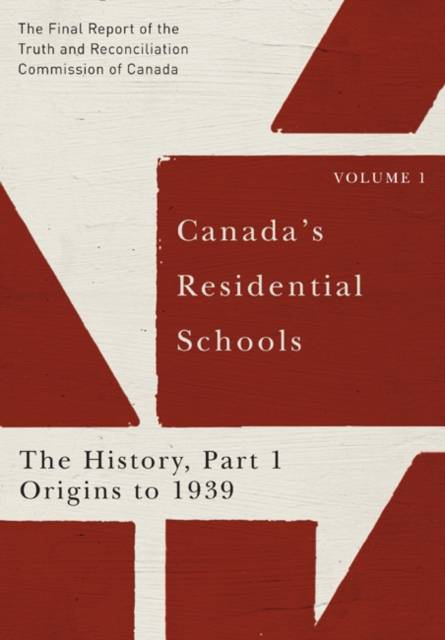
Je cadeautjes zeker op tijd in huis hebben voor de feestdagen? Kom langs in onze winkels en vind het perfecte geschenk!
- Afhalen na 1 uur in een winkel met voorraad
- Gratis thuislevering in België vanaf € 30
- Ruim aanbod met 7 miljoen producten
Je cadeautjes zeker op tijd in huis hebben voor de feestdagen? Kom langs in onze winkels en vind het perfecte geschenk!
- Afhalen na 1 uur in een winkel met voorraad
- Gratis thuislevering in België vanaf € 30
- Ruim aanbod met 7 miljoen producten
Zoeken
Canada's Residential Schools: The History, Part 1, Origins to 1939
The Final Report of the Truth and Reconciliation Commission of Canada, Volume 1 Volume 80
Truth and Reconciliation Commission of Canada
€ 241,45
+ 482 punten
Uitvoering
Omschrijving
Between 1867 and 2000, the Canadian government sent over 150,000 Aboriginal children to residential schools across the country. Government officials and missionaries agreed that in order to "civilize and Christianize" Aboriginal children, it was necessary to separate them from their parents and their home communities. For children, life in these schools was lonely and alien. Discipline was harsh, and daily life was highly regimented. Aboriginal languages and cultures were denigrated and suppressed. Education and technical training too often gave way to the drudgery of doing the chores necessary to make the schools self-sustaining. Child neglect was institutionalized, and the lack of supervision created situations where students were prey to sexual and physical abusers. Legal action by the schools' former students led to the creation of the Truth and Reconciliation Commission of Canada in 2008. The product of over six years of research, the Commission's final report outlines the history and legacy of the schools, and charts a pathway towards reconciliation. Canada's Residential Schools: The History, Part 1, Origins to 1939 places Canada's residential school system in the historical context of European campaigns to colonize and convert Indigenous people throughout the world. In post-Confederation Canada, the government adopted what amounted to a policy of cultural genocide: suppressing spiritual practices, disrupting traditional economies, and imposing new forms of government. Residential schooling quickly became a central element in this policy. The destructive intent of the schools was compounded by chronic underfunding and ongoing conflict between the federal government and the church missionary societies that had been given responsibility for their day-to-day operation. A failure of leadership and resources meant that the schools failed to control the tuberculosis crisis that gripped the schools for much of this period. Alarmed by high death rates, Aboriginal parents often refused to send their children to the schools, leading the government adopt ever more coercive attendance regulations. While parents became subject to ever more punitive regulations, the government did little to regulate discipline, diet, fire safety, or sanitation at the schools. By the period's end the government was presiding over a nation-wide series of firetraps that had no clear educational goals and were economically dependent on the unpaid labour of underfed and often sickly children.
Specificaties
Betrokkenen
- Auteur(s):
- Uitgeverij:
Inhoud
- Aantal bladzijden:
- 978
- Taal:
- Engels
- Reeks:
Eigenschappen
- Productcode (EAN):
- 9780773546493
- Verschijningsdatum:
- 9/12/2015
- Uitvoering:
- Hardcover
- Formaat:
- Genaaid
- Afmetingen:
- 185 mm x 249 mm
- Gewicht:
- 2199 g

Alleen bij Standaard Boekhandel
+ 482 punten op je klantenkaart van Standaard Boekhandel
Beoordelingen
We publiceren alleen reviews die voldoen aan de voorwaarden voor reviews. Bekijk onze voorwaarden voor reviews.









